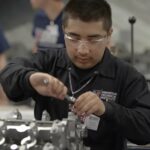Ensuring your child’s safety while traveling is every parent’s top priority. As children grow, their car seat needs evolve, and keeping up with the latest safety standards can be both crucial and costly. Fortunately, Car Seat Exchange Programs offer a valuable solution. These initiatives allow you to trade in your old car seats and upgrade to newer, safer models, often at a significantly reduced price. This not only enhances your child’s protection but also makes advanced car seat technology more accessible to families.
Why Participate in a Car Seat Exchange Program?
Opting for a car seat exchange program brings a multitude of advantages, directly impacting your child’s well-being and your financial planning:
Enhanced Safety Features: Car seat technology is constantly advancing. Newer models incorporate the latest safety innovations and meet stringent safety regulations that older seats might not comply with. By exchanging your old seat, you ensure your child benefits from enhanced protection features in case of a vehicle collision. These programs often emphasize moving families from potentially outdated or recalled seats into models with improved side-impact protection, better harness systems, and more robust construction.
Significant Cost Savings: High-quality car seats can be a considerable investment. Exchange programs ease this financial burden by providing substantial discounts or rebates when you trade in an eligible used car seat. This makes it easier for parents to afford top-rated car seats without compromising on safety. The savings can be particularly helpful for families with multiple children or those needing to transition through different car seat stages.
Environmentally Responsible Disposal: Old car seats, if not properly disposed of, can contribute to landfill waste. Car seat exchange programs often partner with recycling facilities to ensure that traded-in seats are dismantled and their materials are recycled whenever possible. This environmentally conscious approach prevents harmful materials from ending up in landfills and promotes sustainability within the automotive safety industry.
Understanding Car Seat Exchange Programs: Key Questions
Navigating car seat exchange programs can raise several questions. Here are some common queries addressed to help you better understand these initiatives:
What Types of Car Seats Are Eligible for Exchange? Generally, most types of car seats are accepted in exchange programs, including infant car seats, convertible car seats, booster seats, and all-in-one car seats. The condition requirements are usually minimal; programs are designed to take in used seats, regardless of minor wear and tear. However, it’s essential to ensure the seat is complete with its main components. Expired or excessively damaged seats might still be accepted for recycling purposes, but it’s always best to check the specific program guidelines.
How Do You Qualify for a Discount on a New Car Seat? Qualification is typically straightforward. You bring your used car seat to a participating location during the program period. Upon acceptance of the old seat, you will receive a voucher, coupon, or discount code applicable towards the purchase of a new car seat. The discount amount can vary depending on the program sponsor, the model of the new car seat you choose, and the specific terms of the exchange. These programs are designed to be accessible, making it easy for parents to participate and upgrade their child’s safety.
What If You Miss the Exchange Program Event? While exchange programs are often event-based, focusing on specific timeframes, there are still responsible disposal options available year-round. Many recycling centers and waste management facilities accept car seats for recycling. Additionally, some charities or local organizations may accept gently used car seats for families in need, although safety and liability regulations often limit reuse. Checking with your local waste management services or community support organizations can provide alternatives if you cannot attend a specific exchange event.
Preparing to Participate in a Car Seat Exchange Program
Taking part in a car seat exchange program is usually simple. Here’s how to prepare to make the process smooth:
Gather and Clean Your Old Car Seat: Collect your used car seat and give it a basic cleaning. While programs accept used seats, removing loose debris and dirt is a courteous step. Ensure you have the main components of the car seat; while you don’t need all original packaging or manuals, having the seat reasonably complete is helpful.
Locate a Participating Program or Location: Car seat exchange programs can be sponsored by various organizations, including retail stores, hospitals, community safety groups, and car seat manufacturers. Check for announcements from major retailers specializing in baby and child products, or look for local community events promoting child safety. Websites of car seat manufacturers or child safety advocacy groups may also list upcoming programs.
Choose Your Upgraded Car Seat: Before heading to the exchange location, research the new car seats available and decide on one that fits your child’s current stage, your vehicle, and your budget. Consider factors like car seat type (convertible, booster, etc.), safety ratings, ease of installation, and features that enhance comfort and convenience. Being prepared with a preferred new car seat in mind will streamline your exchange process.
Car seat exchange programs are an invaluable resource for parents looking to prioritize their children’s safety. By taking advantage of these programs, you not only ensure your child is secured in a modern, safe car seat but also contribute to environmental responsibility and smart budgeting. Keep an eye out for car seat exchange programs in your community and make the upgrade to enhanced child passenger safety today.

